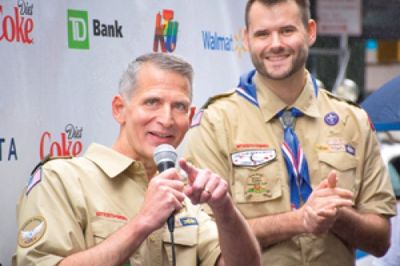Two years ago, the Boy Scouts of America’s (BSA) National Council voted to remove its ban on openly gay youth members. At the time, LGBT activists praised the move, but were disappointed that the Scouts’ ban on adult gay leaders was left in place. On July 27, the National Executive Board was expected to vote to remove that barrier, as well. The change would take effect immediately.
For several years before the youth membership guidelines were changed, the exclusion of members based on sexual orientation was controversial. Although the Boy Scouts of America was a private organization (as affirmed by BSA v. Dale), local scouting groups were often allowed to use public land without charge or were given special privileges at parks and government sites. As more and more municipalities and states passed nondiscrimination laws, this private group’s public access was called into question.
A long listening campaign and much internal debate took place before the youth ban was lifted. Meanwhile, society’s view of gay folks improved at a startling pace; this was 2013, the summer that the U.S. Supreme Court struck down the Defense of Marriage Act in U.S. v. Windsor.
So when the decision was finally made to change only the Scouts’ policy on youth, for many people, it didn’t go far enough. What were the young scouts to do once they became adults? Abandon scouting? Never offer their skills to help young scouts? Actions like that did not align with scouting principles.
In May 2015, BSA president Robert Gates said he believed the ban on gay adult leaders was “unsustainable” and should be changed. On July 10, 2015, the Boy Scouts of America Executive Committee (scouting.org) unanimously agreed; this recommendation brought about the July 27 vote.
According to the analysis of the policy by Scouts for Equality (scoutsforequality.org), the change would do the following:
- Eliminate the BSA’s across-the-board ban on openly gay or bisexual adults in scouting.
- Allow each individual troop or unit to determine its own policy regarding the eligibility of openly gay or bisexual scoutmasters or other adult leaders.
- Prohibit regional governing councils or non-troop entities such as scout camps from discriminating against employees and volunteers based on their sexual orientation.
- Allow previously removed leaders to reapply for their positions.
The new guidelines would allow chartered organizations – most of which are religious organizations – to establish their own criteria for adult leaders. The Church of Jesus Christ of Latter-day Saints (Mormons) is the largest single BSA sponsor of Scouting and is a chartered organization. It has said it will retain the gay adult exclusion policy in units that it controls.
